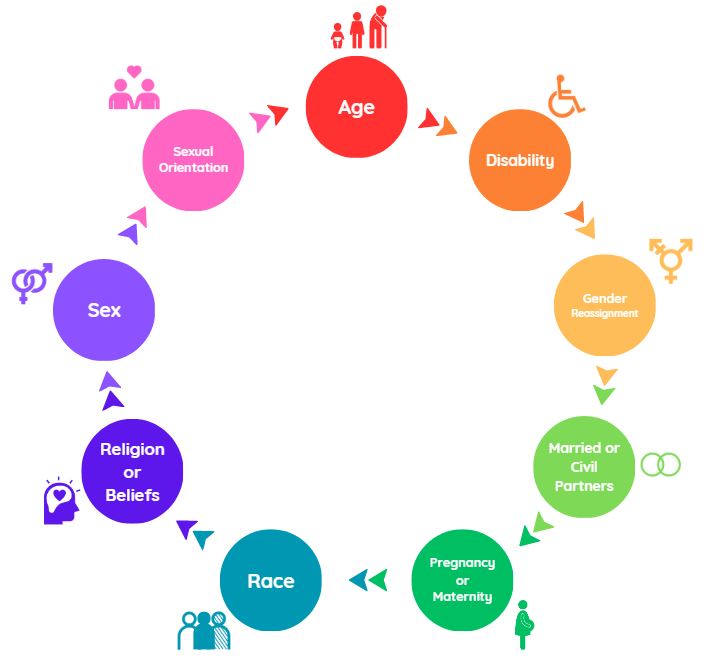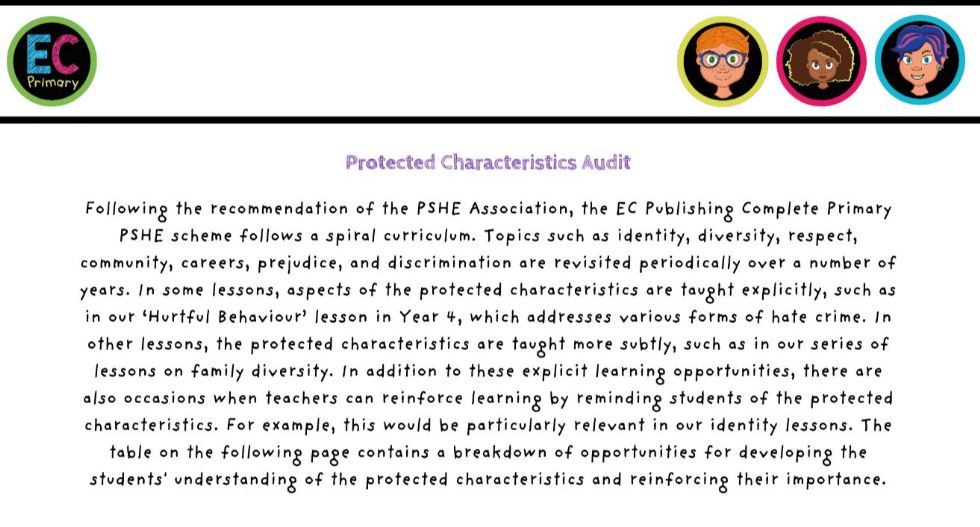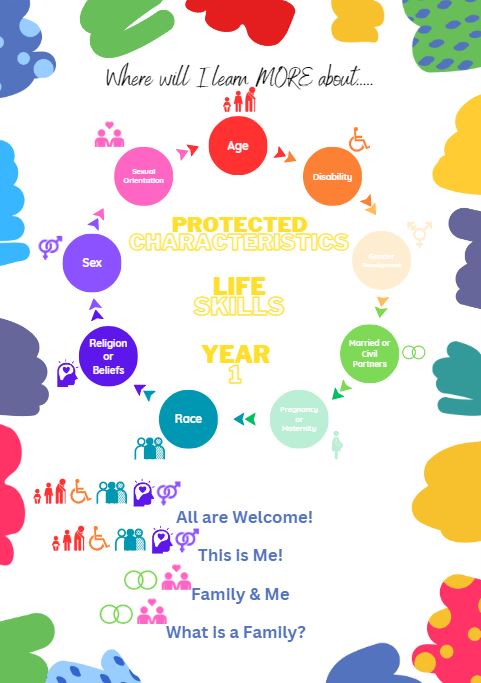Equality
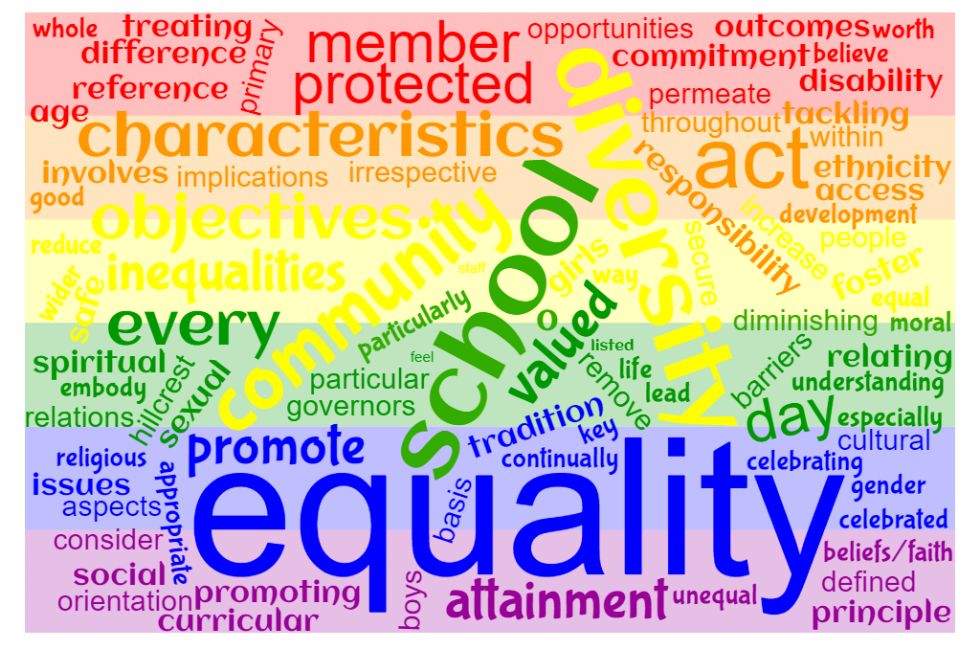
The school is dedicated to the commitment of the staff and Governors to promote equality and to fulfil our responsibilities under the Equalities Duty. This involves tackling the barriers which could lead to unequal outcomes so that there is equality of access and the diversity within the school community is celebrated and valued.
What is the Public Sector Equality Duty (PSED)?
The PSED was introduced by the Equality Act 2010 and applies to all schools, including maintained and independent schools, academies, maintained nursery schools, and maintained and non-maintained special schools.
The PSED has 3 main elements
These are:
- Eliminating discrimination and other conduct prohibited by the Equality Act 2010
- Advancing equality of opportunity between people who share a protected characteristic and people who do not share it
- Fostering good relations across all characteristics – between people who do share a protected characteristic and people who do not share it

The 3 elements are taken from paragraph 5.1 of guidance published by the DfE.
At Hillcrest Primary School, equality is a key principle for treating all people the same irrespective of their gender, ethnicity, disability, religious beliefs/faith tradition, sexual orientation, age or any other of the protected characteristics (Equality Act 2010).
This enables us to:
1. Remove or minimise disadvantages
2. Take steps to meet different needs
3. Encourage participation when it is disproportionately low
What are protected characteristics?
It is unlawful for a school to discriminate against a pupil or prospective pupil by treating them less favourably because of their:
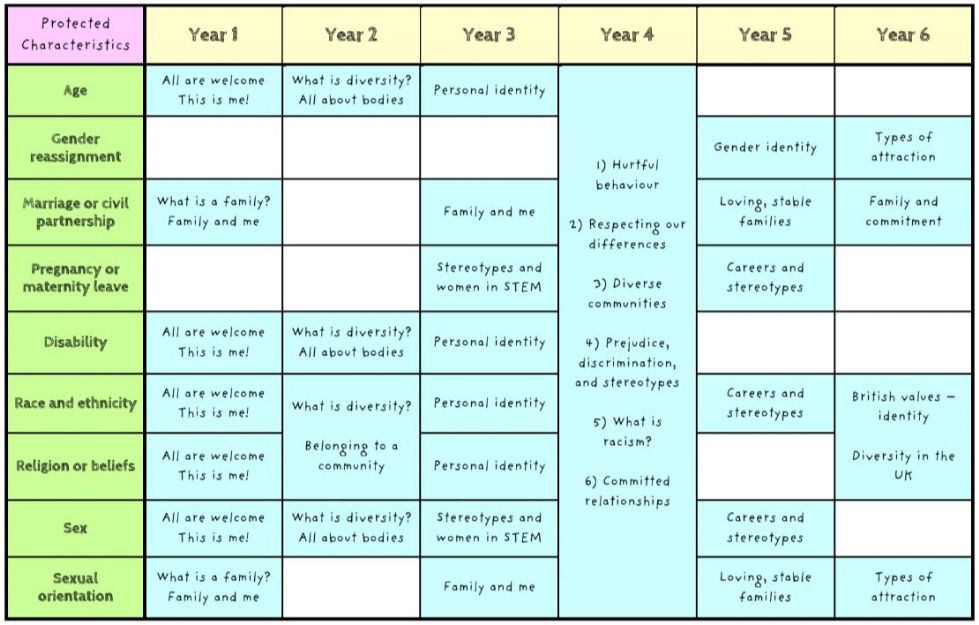
Equality Objectives & Equalities Policy
These objectives embody the commitment of the staff and Governors to promote equality. This involves tackling the barriers which could lead to unequal outcomes so that there is equality of access and the diversity within the school community is celebrated and valued.
1. To promote spiritual, moral, social and cultural development through all appropriate curricular opportunities, with particular reference to issues of equality and diversity

2. To increase whole school understanding of equality and its implications on a day-to-day basis, and in this way to reduce or remove inequalities in attainment throughout the school, particularly inequalities relating to the protected characteristics listed in the Equality Act – especially diminishing the difference between the attainment of boys and girls

3. To continually consider how to foster good relations by promoting and celebrating diversity as defined by the Equality Act

We believe that equality at our school should permeate all aspects of school life and is the responsibility of every member of the school and wider community. Every member of the school community should feel safe, secure, valued and of equal worth. At Hillcrest Primary School, equality is a key principle for treating all people the same irrespective of their gender, ethnicity, disability, religious beliefs/faith tradition, sexual orientation, age or any other of the protected characteristics (Equality Act 2010).
Equalities Policy Nov 20 - Nov24
Equality Objectives Nov 20 - Nov 24

Eliminating Discrimination
We have set a clear vision and policy (see above) which expect every member of staff to act in a non-discriminating manner and be mindful to avoid actions that will be deemed as such to the public and our wider community.
We have up-to-date and ratified policies which set out a clear message that discrimination is not tolerated: staff code of conduct, behaviour, anti-bullying, safeguarding and child protection.
We understand that it is unlawful to fail to make reasonable adjustments to overcome barriers to using services caused by disability and one of our equalities objectives addresses this.
The governing body and school leaders involved in recruitment will avoid unlawful discrimination in all aspects of employment including recruitment, promotion, opportunities for training, pay and benefits, discipline and selection for redundancy. Another one of our equalities objectives addresses this.
Through a structured PSHE curriculum offer, assemblies, workshops and visits, equalities will be discussed with and taught to the children, exemplifying the British Values and school values that we believe in.
Advancing equality of opportunity
The following list illustrates some of the main ways in which we seek to fulfil our moral and legal responsibilities to ensure equality within our school community. This is by no means an exhaustive list.

Because we have a duty towards the children in our care as well as to our employees, some measures may be relevant to each of these groups to a greater or lesser extent. However, there is of course a crossover between many of these elements, and although they are numbered for ease of reference, the order in which they are listed should not be seen as being in terms of degree of importance, and nor should each element be seen as a discrete unit.
We believe that equal opportunities to be an absolute principle, and these elements taken together are the basis on which we seek to embody this principle.
- When reviewing school policies, the governing body takes into account any relevant equal opportunity implications. Where relevant, the details of equal opportunity considerations will be specifically identified. The school's key policies are kept updated on our website, and all our policies are available by request at the school office.
- Progress and attainment of all children in the school, including the progress and attainment of specific pupil groups, is regularly analysed and discussed. Where we identify significant variations between the children who share a protected characteristic and children in the school generally, we then explore the reasons behind this. We believe it is vital that children in particular groups are not inadvertently disadvantaged. However, we are equally diligent in not assuming that the discrepancy is necessarily a consequence of a particular characteristic. We look at children individually, and examine why the discrepancy is showing up, so that we are best placed to support children in the way that is most appropriate for them. We also recognise that each child is an individual, composed of a multitude of characteristics, and their inclusion in one or more protected characteristic groups should not be seen to define them without reference to everything else that goes to make the whole child.
- Our curriculum is open to all children, and we will always make adaptations where necessary to accommodate the particular needs of a child or group of children.
- We model the British values of respect and tolerance to all people, regardless of characteristics, and we consider it our moral duty to promote and develop this understanding and good practise in the children themselves. If a child demonstrates intolerance or disrespect with regard to the characteristics of another person, we will utilise restorative practises to work with that child, strengthening their understanding of why their behaviour or language has not been appropriate and the effects it has on other people. We believe that education is by far the most effective response to incidents of intolerance or disrespect of any sort.
- We are a Telling School, promoting a culture in which children feel comfortable sharing concerns and worries with adults in school. Although worries can affect all children, those in protected characteristic groups can face greater barriers than their peers do. We ensure that the children know that there are key adults who provide a safe space for them to go to, especially those who may be beginning to identify/question their identity as LGBT.
Three principles are at the heart of our approach to supporting children with telling their concerns.
Firstly, a recognition that what might seem like a small issue to an adult can feel hugely important to a child, so that we listen to the root of a child's anxiety rather than what might be its surface manifestation. An example of this might be a child who complains that no-one will play with him or her, and understanding that what the child is probably feeling is not so much the denial of the game, but more a sense that other children do not find them appealing enough to play with.
Secondly, through our structured PSHE/RSE curriculum, we encourage children to develop the language and understanding of complex emotions, so that they are better able to articulate what they are feeling. If a child can't explain what it is that is distressing them, they are less likely to seek help. Children in certain protected characteristic groups may need greater levels of support in developing these skills.
Thirdly, we place great emphasis on the development of strong relationships between all adults and children in the school, based on mutual trust and respect. Consequently, when a child feels vulnerable or worried, they are able to choose, from a number of adults that they know well, the person they feel most comfortable approaching.
- We promote a culture in the school that recognises the needs of staff members, whether this is in terms of emotional support, time off to attend family events or medical appointments, or requests for changes in working arrangements. Individual needs of staff members can sometimes be directly linked to their membership of a protected characteristic group; therefore, we see our duty to be compassionate employers to be particularly relevant in supporting members of staff in this respect.
- We also promote a culture in which parents feel comfortable to approach the school with concerns or difficulties, which again can sometimes be linked to their membership of a protected characteristic group. In addition to increasing parents' confidence in approaching the school with issues that may relate to protected characteristics, the strong relationships between staff and parents has helped to develop a culture where the strengths and needs of protected characteristic groups are understood, acknowledged and valued.
Fostering good relations
To help us foster good relations amongst all of our school community, in addition to our whole school commitment to British Values (focusing especially on Mutual Respect) our high quality PSHE/RSE curriculum teaches pupils to respect the differences that run through all people, and to enjoy the richness that it brings to our society.

We are a welcoming school, dedicated to ensure that all members of the school community feel safe, welcome and valued.





